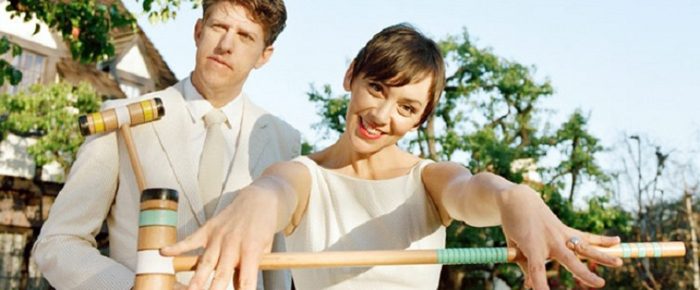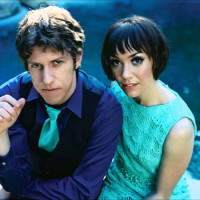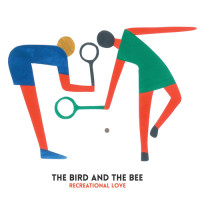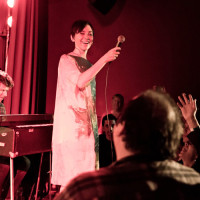
By Eleni P. Austin
Back in 2007, it seemed as though The Bird And The Bee literally burst on the music scene with their self-titled debut. But the duo, made up of vocalist Inara George and multi-instrumentalist Greg Kurstin had been mainstays of the Los Angeles music community for several years.
Inara George grew up in Topanga Canyon, fully aware of her musical legacy. Her dad was Lowell George. A Hollywood native, Lowell nurtured musical aspirations even as a child. At age six he appeared on the Ted Mack’s Original Amateur Hour, singing a duet with his brother.
During his teen years he was mildly contemptuous of Rock & Roll, preferring West Coast Jazz, along with artists like Les McCann and Mose Allison. He briefly fronted his own band, the Factory, before joining Frank Zappa’s Mothers Of Invention as rhythm guitarist in 1968.
But Lowell George found his most lasting creative and commercial success as architect and front man for Little Feat, which he formed in 1969. Their style was an eclectic mash up of Rock, Blues, Country, Boogie and Jazz. Sadly, his appetites eclipsed his protean talents and Lowell George died in 1979 from heart failure, just five days before Inara’s fifth birthday.
At first, Inara concentrated on theatre, performing Shakespeare as a kid, and later moving to Boston to study acting in the classical theatre tradition. As a lark, she and some high school pals created a band called Lode and were surprised when they got signed to Geffen Records in 1996.
Lode released the pleasing Legs & Arms before Inara teamed up with Bryony Atkinson to form Merrick. Their indie-rock collaboration lasted a few years until she embarked on a solo career. In 2004, as she was recording her first solo album, All Rise, when her producer Mike Andrews introduced her to Greg Kurstin.
Greg had also grown up in Los Angeles, and had his own Zappa connection, co-writing the b-side to classmate Dweezil Zappa’s “My Mother Is A Space Cadet” at age 12. He focused on Jazz piano throughout high school and moved to New York to study with Charles Mingus’ pianist, Jaki Byard.
After concentrating on Jazz for several years, he returned to L.A. and recorded a demo with his friend Tommy Jordan as Geggy Tah. David Byrne signed them to his boutique label, Luaka Bop. Ultimately Geggy Tah released three albums before disbanding.
Greg made a living as a session musician, playing on albums by Beck, Red Hot Chilli Peppers, Matthew Sweet and Jane’s Addiction, just to name a few. By the time he and Inara met, he was ready to concentrate on his own music. They bonded over shared musical tastes and collaborating with her seemed like a natural fit. She was the Bird to his Bee.
Blue Note quickly signed the duo, and after a couple of EPs, their self-titled full-length arrived in January 2007. Mixing French Pop, Tropicalia, lush Beach Boy harmonies, warm instrumentation and Inara’s pithy lyrics, the album received rave reviews. It wasn’t a commercial smash, but L.A.’s taste-making station, KCRW put it in heavy rotation, guaranteeing prime exposure.
They swiftly returned two years later with their sophomore effort, Ray Guns Are Not Just The Future. Their second album was just as beguiling as the first, trading the international flair of their eponymous record for a jazzier sound. It also included the wickedly amusing “Diamond Dave,” wherein Inara pledges her undying devotion to Van Halen’s penultimate front man, David Lee Roth.
For the next couple of years, Inara and Greg tackled separate projects. She recorded a second solo album, “An Invitation,” produced by eccentric visionary, Van Dyke Parks. He handled production chores for Lily Allen’s “It’s Not You It’s Me” album. When they reconnected, rather than record an album of new material, they whimsically paid tribute to another well-known duo, Hall & Oates.
Released in 2010, Interpreting The Masters Volume 1: A Tribute To Daryl Hall And John Oates offered fresh takes on Pop classics like “She’s Gone” and “Sara Smile” that recalibrated the original versions without radically altering the signature sound.
In the last five years, Inara and Greg have both been busy raising families and making music independently. Inara formed the Living Sisters with singer-songwriters Becky Diamond and Eleni Mandell, and released three albums. Greg remains an in-demand producer, working with everyone from Beck, Beyonce, Sia, the Shins, Foster The People, Kelly Clarkson, Lana Del Rey and Billy Idol. But no matter what, every Friday, they carved out time to work on The Bird And The Bee music.
The result is their new record, Recreational Love. Typically, it sounds nothing like their first two albums. Taking a hard left turn, the music here seems to draw inspiration from late the ‘70s intersection of Disco and New Wave.
“Young And Dumb” gets the album off to an infectious start. Pulsating keys, electronic blips and bloops, rippling vibes and synthesized hand-claps connect under Inara’s teasing falsetto. Mocking a successful rival, she resorts to school yard taunts to get her point across; “My mother said the very next one and you are not it!” Fractious piano notes on the instrumental break underscores her irritation.
Early ‘80s Electro-Pop soundscapes are fully explored on “Will You Dance” and “Runaway.” Inara affects the breathless style of New Wave chanteuses like Terri Nunn from Berlin and Dale Bozzio of Missing Persons, overa four-on-the-floor beat.
Except for the distaff vocals, the latter easily recalls the space-age love songs from hair-tastic Flock Of Seagulls, plus a soupcon of Hall & Oates’ “I Can’t Go For That” attitude.
Tinkly percussion, airy synths and lush harmonies buoy Inara’s succinct seduction style. “We could get fancy, you could dine me and dance me/ But I’m telling you that’s really my style, I’m not a cheap date, no mystery, no switch no bait/You could search the whole wide world, I’m just not like any girl.”
The best track here is “Los Angeles” a heartfelt ode to their shared city of origin. Although it’s powered by a kick-drum beat, the melody is still equal parts swoony and feather light. Clearly sick of the shit-talk the City Of Angels endures at the hands of Johnny-Come-Latelys (or worse, New Yorkers), Inara issues a sharp rebuke; “Stop asking me where I come from, I’m from L.A.”
Finally, she gently addresses her hometown directly, “Los Angeles, don’t listen to a word they say, they don’t need you in the same way/Los Angeles, don’t ever let them change you, they don’t know you like I do.”
Several tracks feature stylistic flourishes that echo, but never imitate, beloved late ‘70s touchstones. The title track is a not so subtle swipe at the whole “Friends-with-benefits” paradigm, (known in ‘70s nomenclature as “sport fucking”). As guitar lines squiggle, keyboards quiver and percussion percolates, Inara presents her case for serial monogamy using a soulful, Minnie Ripperton-esque falsetto.
The effervescent “Jenny” is anchored by a rubbery, triple-time beat, urgent synths and a funky base coat that absolutely recalls the Tom-Tom Club’s “Genius Of Love. Meanwhile, “Please Take Me Home” could be a cosmic cousin to Andrea True Connection’s “More, More More.”
Finally, “Doctor” splits the difference between Carol Douglas’ classic, “Doctor’s Orders” and Giorgio Moroder’s pioneering production work for Donna Summer and Blondie. It’s lush and slightly ripe, but even the Supertramp-y honking sax solo is ridiculously fun.
“Recreational Love’s final two tracks offer a bit of a cool-down after all the frenetic revelry. “We’re Coming To You” is a downcast plea for emotional rescue. Bloopy instrumentation and Inara’s weightless vocals keep everything on an even keel.
The album closes with the hushed “Lovey Dovey” accompanied by quiet, contemplative keys, Inara’s mien seems ethereal and appealing, a soothing and lovely conclusion.
Recreational Love offers a refreshing slice of summery fun. Even if it takes another five years to craft a follow-up, The Bird And The Bee is always definitely worth the wait.












































